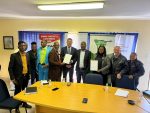Deep-South Resources has announced that it has appointed the MSA Group of South Africa to produce an updated National Instrument (“NI”) 43-101 Mineral Resource Estimate for the Company’s 100%-owned advanced Haib copper project located in the south of Namibia.
The mandate of MSA was interrupted when the Ministry of Mines refused to approve the renewal of the Haib Copper license. The Mineral Resource Estimate and subsequent technical report will follow the completion of the drilling program that was stopped in June 2021.
There are still 5,200 meters of drilling to be completed.
Pierre Leveille, President & CEO of Deep-South stated that: “We are pleased to have re-engaged MSA; their vast experience will help to enhance an already robust project and unlock further value while reducing risk for our shareholders. With the backdrop of a strong copper price, we are highly optimistic for the coming years that Haib will garner additional interest from investors and other interested parties.”
MSA has already started to review the historical drilling data in order to specify the additional drilling needed to produce the Mineral Resource estimate. The mandate of MSA includes site visits to verify data collection, quality assurance and controls, develop a structural geological model in collaboration with Deep-South’s geological team, assess the presence of domains and model these domains in three dimensions, complete a geostatistical study for each domain and issue an updated NI 43-101 Mineral Resource estimate.
Deep-South Resources resumed work at its Haib copper project recently as government renewed the miner’s prospecting license for two years.
The awaited permit followed a long-dragged court battle with the Namibia’s mining and energy ministry, which in 2021 declined to re-issue the project’s licence.
Minister Tom Alweendo said at the time that Deep-South had failed to advance to a prefeasibility stage and had not completed the proposed drilling program as planned either.
The Vancouver-based miner took the case to Namibia’s High Court, which in March this year ordered the Ministry to restart Deep-South’s licence renewal application procedure.
“This is a very good news,” president and chief executive officer Pierre Leveille said in the statement last month. “With the scarcity of major copper developments on the horizon, Haib [holds] promise as a significant undeveloped deposit.”
Deep-South said it had begun preparations to resume the project’s development of as soon as possible.
Shares in the company skyrocketed after the announcement. They climbed as much as 69% in early trading closing more than 38% higher.
Haib Copper is a large copper-molybdenum deposit situated 40km from the southern boundary of Namibia. The license covers 370 sq. km (37,000 ha).
When the license renewal was denied, in June 2021, deep-South was underway to complete a 10,000 meters drilling program and reading further metallurgical test work. The company was also was starting an updated resource estimation for a a C$7.1 million ($5.4m) feasibility study and C$25.5 million ($19m) pilot plant.
From April 2017 to April 2021, Deep-South invested more than C$2 million ($1.6m) on the Haib project, including an updated preliminary economic assessment.
According to the PEA, the Haib copper mine has an estimated 24-year life and production capacity of 35,332 tonnes of copper cathode and 51,080 tonnes of copper sulphate a year.
The MSA Group is a leading provider of exploration, geology, mineral resource and reserve estimation, mining and environmental consulting services to the mining industry. Established in 1983, MSA has serviced its international client base in more than 40 countries. MSA is the leading provider of mineral exploration services on the African continent.
Deep-South Resources is a mineral exploration and development company. Deep-South’s growth strategy is to focus on the exploration and development of quality assets in significant mineralized trends and in proximity to infrastructure in stable countries. The Company holds the Haib Copper Project in Namibia and holds an interest in three exploration licenses in the Copperbelt in Zambia.










